
A lottery is a form of gambling in which participants pay a small amount of money for a chance to win a larger sum. There are a number of different types of lotteries, including financial and charitable ones. Regardless of the type, lottery is often seen as an addictive form of gambling and has been criticized by some. However, many people play for the chance to get a better life, and the winnings from some lottery games can be very large.
The term “lottery” can mean a variety of things, but the most common is one in which people are paid to participate in a random selection process. For example, the lottery might involve drawing numbers from a container or a hat to determine a winner. The prize might be anything from a vacation home to a new car, but it is usually monetary in nature. There are many different ways to run a lottery, and each has its own rules and regulations. Some are conducted by private organizations, while others are run by state governments.
Lotteries are used for a wide variety of purposes, from charitable causes to the awarding of public service positions. For instance, a university might hold a lottery to decide which students will be accepted into its program. Other lotteries might be used to award subsidized housing units or kindergarten placements.
Despite the negative image associated with lotteries, they are an important source of revenue for states and charities. In the United States, there are more than 200 lotteries with total sales of more than $44 billion each year. However, the chances of winning a lottery are low, and it is possible to make more money through other means, such as investing in stocks or real estate.
In order to ensure that the lottery is fair, it must follow certain basic rules. First, a lottery must be completely random to ensure that there are no biases. This can be achieved by a computer system or through the use of a regular mail system for sending tickets and stakes. The rules must also specify the frequency and size of prizes. A percentage of the prize pool must go to costs such as advertising and organizing the lottery, while the remainder is available to winners.
Lotteries are often marketed with the message that they help support state programs. While that is true, the percentage of lottery proceeds that are available to states is relatively low compared to other state revenues. Moreover, consumers are not aware of the implicit tax rate that is built into the price of a lottery ticket. This makes it difficult to justify lottery revenues in comparison to a more transparent revenue source such as a state tax.